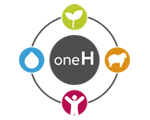
Your account
Welcome in the section "AUTHORS ZONE" !
Abstract submission is now open !
Last Call Deadline for submission of abstract extended : 07th of December 2023.
And many thanks for your contribution.
The Scientific Committee of One H 2024.
SESSIONS
1. OneHealth effects of changes
Chairpersons: Juan-Manuel ARIZA-CHACON (Oniris, France)
In a One Health perspective, the impact of climate change, biodiversity loss, habitat destruction, and human activities is crucial as they are interconnected and have profound implications for human, animal, and environmental health. Climate change leads to environmental disruptions, biodiversity loss weakens ecosystem functioning, habitat destruction increases the risk of zoonotic diseases, and human activities contribute to these challenges. Understanding these connections is vital for developing integrated strategies to protect and promote the health of all living beings. Mitigating climate change, conserving biodiversity and habitats, adopting sustainable practices, and fostering interdisciplinary collaboration are essential steps in addressing these interconnected challenges.
The aim of this session is to discuss the impact of climate change, biodiversity, habitat destruction and human activities :
- On the emergence or re-emergence of infectious diseases / vector- borne diseases / foodborne diseases
- In humans or animals
- Involving interactions between farm animals- Human populations- environment
2. Enhanced integrated surveillance
Chairpersons: Florence TARDY (Anses, France) for Antimicrobial and bacterial zoonoses
Céline RICHOMME (Anses, France) for Wildlife and environment
Gaëlle SIMON (Anses, Fance) for Viral zoonoses
Enhancing integrated surveillance in a One Health perspective is crucial for early detection of disease outbreaks, understanding disease dynamics, assessing public health risks, developing early warning systems, promoting collaboration, and implementing a holistic approach to health management. By monitoring and sharing information across sectors, it becomes possible to identify emerging diseases, assess risks, and develop effective prevention and control strategies. Integrated surveillance supports the implementation of a One Health approach, acknowledging the interdependence of human, animal, and environmental health.
Communications addressed to this session should deal with how to better integrate and/or coordinate our surveillance systems in animal health, human health and/or environment for infectious diseases
3. Risk perception, communication and management
Chairpersons: Florence AYRAL (VetAgrosup Lyon, France)
In a One Health perspective, risk perception, communication, and management are vital for effectively addressing the complexities of infectious diseases. Understanding stakeholder perspectives and conducting risk assessments facilitate a clear understanding of potential health impacts and uncertainties. Effective risk communication involves clear and accessible messaging, collaboration, and tailoring approaches to different target groups. Integrated risk management approaches consider the interconnectedness of human, animal, and environmental health, including surveillance, vaccination, and ecosystem conservation. Preparedness and adaptive management ensure timely response and continuous improvement. By integrating these elements, stakeholders can collaborate, engage communities, and implement comprehensive strategies to address infectious diseases holistically.
Communications addressed to this session should deal with sociological issues as regards risk perception, communication and transdisciplinary risk management for a One Health approach.
4. New tools to meet OneHealth challenges
Chairpersons: Anne-Marie POURCHER (INRAE, France) and Philippe FRAVALO (CNAM, France)
Meeting One Health challenges requires the development and implementation of new tools and approaches. These include integrated surveillance systems, advanced molecular diagnostics and genomic sequencing, One Health information sharing platforms, predictive modelling and data analytics, behavioral and social science research, One Health education and training programs, and fostering innovation and technology transfer. These tools enhance our ability to detect and respond to disease outbreaks, understand disease dynamics, promote interdisciplinary collaboration, and address the interconnectedness of human, animal, and environmental health. Continued investment in research, infrastructure, and capacity building is crucial to effectively tackle emerging infectious diseases, antimicrobial resistance, and environmental threats in a holistic and sustainable manner.
During this session, novel and alternative methodologies will be explored by concrete examples in data collection/management/analysis and other tools in the perspective of meeting One Health challenges




